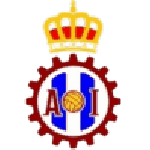| Coach | NA |
| Venue | Estadio Román Suárez Puerta |
Real Avilés predictions
Predictions for Real Avilés: See upcoming and historic predictions for Real Avilés below.
Disclaimer: Past performance does not guarantee future results. Betting involves risk; only wager what you can afford to lose. Always gamble responsibly.
Real Avilés latest transfers
| Date | Player | From | To | Price |
|---|---|---|---|---|
| 2019-01-09 | Natalio | Olot | Real Avilés | € Free |
| 2018-01-25 | Jorge Nicolás Pandiani Quaglia | Canadian | Real Avilés | € Free |
| 2014-08-20 | Manu Bonaque | Almeria | Real Avilés | € Free |
About Real Avilés
Real Avilés Club de Fútbol is a Spanish football club based in Avilés, in the autonomous community of Asturias. Founded on 26 January 1903, it is one of the oldest football clubs in Spain. The team currently competes in Tercera División, the fourth tier of Spanish football.
The club was initially known as Stadium Club Avilesino, and it was not until 1983 that it adopted its current name, Real Avilés Club de Fútbol. The club's home ground is the Estadio Román Suárez Puerta, which has a seating capacity of 5,400 spectators.
Throughout its history, Real Avilés has had several stints in Segunda División, the second highest level in the Spanish football league system. The club's most successful period came in the late 1980s and early 1990s when they spent six seasons in Segunda División. However, they have not been able to return to this level since their relegation in 1992.
Despite its struggles in recent years, Real Avilés remains a significant part of the local community. The club has a dedicated fan base and is known for its youth development system, which has produced several players who have gone on to play in higher divisions.
The club's traditional colours are blue and white, inspired by the maritime history of Avilés, a city known for its port and shipbuilding industry. The team's emblem features a ship, representing the city's seafaring tradition, and the royal crown, granted by King Alfonso XIII in 1917.
Over the years, Real Avilés has had several notable players and coaches. Among them is Luis Aragonés, who played for the club in the 1960s and later became a successful coach, leading Spain to victory in the 2008 European Championship.
Despite the ups and downs, Real Avilés continues to inspire passion and loyalty among its fans. The club's long history, its connection to the local community, and its commitment to nurturing young talent ensure that it remains a vital part of Spanish football.
















